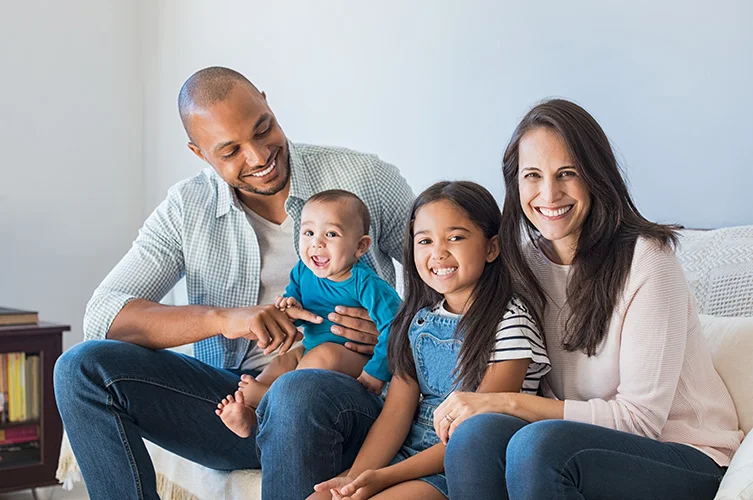Biological Parental Rights After Adoption

Adoption is a permanent, life-long commitment. You must give it careful thought before making any final decision. Around 135,000 children were adopted every year in the United States. Of those 15% were voluntarily relinquished babies. Once the adoption is finalized, the birth parents cannot do anything. They have relinquished their parental rights and responsibilities.
The adoptive parents, however, do have the right to make decisions for their adoptive children. They can enroll them in school, make medical decisions, set boundaries, etc. There are certain circumstances when they allow the biological parent(s) visitation rights. But this is done at their discretion.
If you are considering adopting, this article walks you through parental rights. Above all, it talks about the legal and parental rights of birth parents after adoption.
Do Birth Parents Have Any Rights After Adoption?
No! The birth parents do not have any parental rights to the child after adoption. If you are the adoptive parents, you make all decisions and have full legal rights. You are also financially responsible for the child until they are legally an adult.
“Post-adoption contact agreements” are contracts that allow two families to meet with each other. They give families peace of mind and keep the children out of harm’s way.
What Are the Rights of Biological Parents After Adoption?
When the finalized by the court, the biological parents lose all legal rights to the child. That means that the biological parents do not have the right to decide on behalf of the child. She also doesn’t have the right to petition for legal custody, even visitation.
The first step of the adoption process is the termination of parental rights. Birth parents generally surrender their rights by choice when they choose adoption. But, if it is involuntary, the court will terminate the rights whether or not the birth parents accept. For example, this happens in the case of abuse and neglect.
On the other hand, the court will not accept the voluntary termination of rights if you do not consent to adoption. The parents have to choose a qualified couple through an adoption agency.
Adoptive parents have a duty to notify the biological parents in case of severe illness or death. But, they should not contact for personal reasons such as graduations and marriages. This might lead to confusing situations that will hamper your relationship with your child.
What Are the Parental Rights of Biological Parents in the Adoption Context?
The rights and duties of the biological parents end once the adoption is final. The birth parent does not have any obligation towards his/her child. Moreover, you also lose physical custody and the right to make decisions for the child.
At this point, adoptive parents gain full legal and physical guardianship of the child. But, it is rare that the adoptive family will consider an open adoption arrangement. Nevertheless, some families do come forward for the greater good. In the case of open adoptions, the birth and adoptive parents agree on visitation rights and regular updates. If there is no such agreement, it will depend on the adoptive parents.
Do Biological Parents Have Visitation Rights?

As adoptive parents, you have the sole authority to decide on the visitation rights or not. However, you should not refuse visitation rights out of spite or malice. Instead, it should be based on the best interest of the adoptive child.
Visitation rights enable the child to maintain a healthy bond with the birth family. This can help create strong bonds in the future. But, this will happen only if they are aware of their legal rights while allowing visitation.
Can Adoptive Parents Terminate Contact with Birth Parents?
Generally, adoptive parents are not required to communicate with birth parents after adoption. The only exception is any severe illness or death. In such cases, they immediately contact the biological parent(s). But, parents of adoptive children should let them develop a relationship if they wish so.
How Can Adoptive Parents Respect Birth Parents’ Rights After Adoption?
There are ways adoptive families show they value their adoptive child’s biological family. For example, the occasional visit or photo exchange between biological and adoptive parents. This helps keep the birth parent involved in the child’s life. And, this doesn’t mean that the adoptive family(s) doesn’t have the decision-making power. Apart from visitation rights, the following can help maintain a healthy relationship:
- Exchange photos
- Communicate via e-mail or video chat
- Regular phone contact
What Is Contact Between Birth Parents and Adoptive Parents?
Establishing contact between birth parents, adoptive parents, and the child is vital. It helps both the families to connect and form a healthy relationship.
The birth mother should play a full role in choosing whom to become parents for their baby child. In most cases, birth parents meet with prospective adoptive parents during the pregnancy. Once the adoption happened, they would send the birth mother letters and pictures. It is generally done in monthly format every six months and then every year. The adoptive family will send photographs and letters to the newborn’s parents.
Can a Birth Parent Receive Counseling?
Every natural parent has the right to counseling before and after adoptive placement. It will help them to deal with emotional and physical trauma.
Birth mothers are at greater risk of experiencing depression due to negative feelings such as guilt and shame. Therefore, pre-adoption counseling is beneficial for both adoptive and birth mothers. This is because it helps them deal with their feelings in a positive manner. It also helps the birth parents to grasp the possible issues that may arise after adoption.
Important Adoption Parental Rights You’ll Have as a Biological Mother
Adoption is a fantastic experience. But it can also be scary for both the adoptive and birth parents. As the birth mother of your child, you have many rights that you should know about. Here are some critical adoption rights to keep in mind if you’re making an adoption plan:
The Parental Right to Choose Adoptive Parents for Your Child
You have the legal authority over who will adopt and raise your baby. Many birth mothers feel more comfortable choosing adoptive family(s) that are of a similar age, ethnicity, or religion. It is also common for adoptive families to be on their second marriage—or even married at all!
You can choose parents that share your values and beliefs. But it is important to remember that everyone is different.
The Parental Right to Change Your Mind at Any Time Before Signing the Legal Paperwork
Many birth mothers spend months or even years trying to decide on an adoption plan. It’s legal to change your mind before adoptive parents sign the legal paperwork. All you need is to explain why. This could be because the adoptive family(s) changed their minds. Or has other children that they lost to the social services. They can also refuse if the adoptive parents refuse to provide medical information.
The Parental Right to Information About the Financial Situation and Parenting Abilities

Adoptive parents should give you their financial information to help make an informed decision. Some birth mothers prefer parents to have money, education, or other resources necessary for providing a good life. But this is not always the case. Sometimes the adoptive family could be living off of one income or even have student loan debt.
You will also want to know whether the parents plan on teaching your birth culture and/or religion. Finally, you should ask about their exposure to your language if you want your child to learn it later in life.
The Parental Right to Visit Adopted Child After Adoption Finalization
Visitation can be good for the adoptive child. The adoptive parents can give you the chance to see your baby after adoption.
Adoptive families may offer a visit with the adoptive child at their home. If not, they can also come and meet you somewhere else—like a park! Visits usually last an hour or two to start. But over time, they may be open to extending it.
Can an Adopted Child Claim Right to His/Her Biological Father’s Property?
No! Once adopted, the child cannot lay any claim to his/her biological father’s property. This is because the adoption process terminated the child’s legal rights. So the adopted child cannot claim to have any right to the property.
Does an Adopted Child Have Inheritance Rights from Birth Parents?
No! Once adopted, the child doesn’t have inheritance rights from the birth parents. This is because they are not the legal guardian of the child. The adoptive parents are. Hence the adopted children don’t have any inheritance rights from birth parents!
However, It doesn’t mean that the birth parent cannot include the child in his/her will. If the birth parents provide for the child in their will, no one can take that away from the child.
Can Biological Parents Regain Custody Post-Adoption?
No! Once the child is adopted, the biological parent doesn’t have any legal right let alone regain guardianship. After the child’s adoption, the adoptive parent has the legal right. They are responsible for their adopted children until they turn 18 or 21 in some states.
Biological parents can take back their consent to adoption if one or more of the following is found to be true:
- The birth parents were…
- Forced into giving up their child for adoption against their will.
- Compelled to sign the relinquishment document either under duress or fraud.
- The adoptive parents failed to…
- Provide proper care and/or education to the adopted child.
- Meet the minimum pre-placement requirements.
- Provide financial support or they abandoned the child.
- Uphold their parental responsibilities and obligations to the child.
Many judges will ignore a hearing at first for lack of standing. But in theory, they should permit the petition to succeed and will grant a custody order if standing is found.
How Do I Revoke My Consent for Adoption?
Revoking the consent for adoption is a double-edged sword. For the birth parents, the ability to revoke consent is a second chance to have their child back.
But, on the other hand, revocation is demanding on the adoptive parents. It will be especially on those looking to adopt for a long time.

Revocation of consent is not easy to get approved by the court. The adoptive family can also oppose it if they are willing to keep the child in their custody. The consent revocation for adoption varies from state to state. Hence, ensure that you talk with an adoption attorney before making a decision.
Once the birth parents consent to the adoption, they have seven days to revoke the consent. The seven-day timeline includes the weekend and holidays. However, if the seventh day falls on a weekend, you would have to wait until the next business day.
The adoptive parents will be notified when the birth parent consents to the adoption. But they won’t know about revocation unless or until it is filed in court and served.
It is hard to predict how long it would take for a judge to consider your motion. But if you are lucky, they might answer within 30 days. In any case, there is a chance for the adoptive parents to oppose your motion for revocation.
If the court denies revoking the consent, you can still appeal that decision in higher courts. But chances are very rare for it will be granted.
Conclusion
Adoption is a personal and permanent decision. Choosing to adopt a child means making a lifelong commitment with no going back.
Once you have given consent to adoption, you cannot take it back. Even if the other person does not do a good job or changes their mind, they will still raise your baby. However, under certain circumstances, you can revoke your consent but within seven days of consent.
If you are still interested in adoption, contact the Arizona Department of Child Safety (DCS). They can guide you about how to begin the process before making any final decisions! You may also want to have a law firm on retainer for any legal advice. One such law firm that comes highly recommended is Randle, Palmer & Associates. They have many years of experience in their practice of adoption and parental rights and can assist you with any issues or concerns you may have. Contact Randle, Palmer & Associates for your free consultation today!



